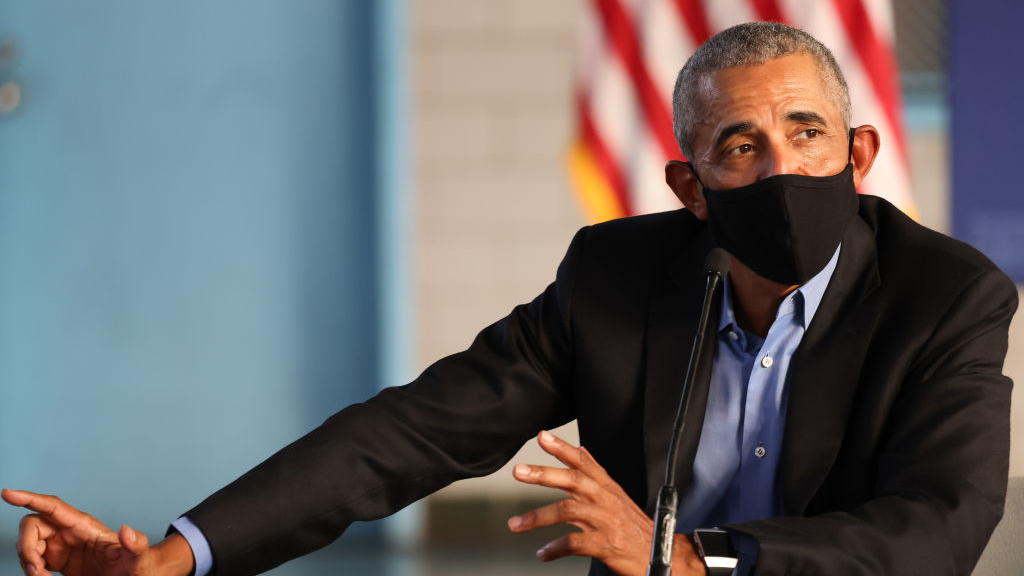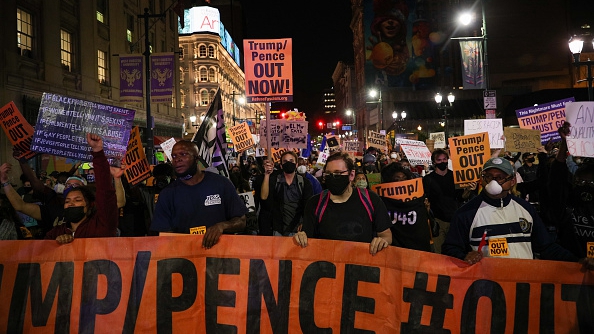
Former U.S. President Barack Obama participates in a round table discussion with local officials during his first in-person campaign event at the Gathers Community Center for Democratic presidential nominee Joe Biden, in Philadelphia, Pennsylvania, October 21, 2020. /Getty
Former U.S. President Barack Obama participates in a round table discussion with local officials during his first in-person campaign event at the Gathers Community Center for Democratic presidential nominee Joe Biden, in Philadelphia, Pennsylvania, October 21, 2020. /Getty
Editor's note: Joel Wendland-Liu is an associate professor of the Integrative, Religious and Intercultural Studies Department at Grand Valley State University in the U.S. The article reflects the author's opinions, and not necessarily the views of CGTN.
In what appears to be a stunning admission, former U.S. President Obama told a reporter recently that he had wanted to be harsher with China during his presidency. Only the global Great Recession prevented him from doing so. That economic collapse demanded international cooperation to find solutions.
Instead of hostility, he felt compelled to seek cooperation with China. "I could not have a trade war in 2009 or 2010. At that point, I needed the cooperation of China … just to restart the global economy," he was quoted as saying.
This is a stunning comment because it reveals that Obama shared a similar mindset with outgoing Republican Party boss Donald Trump on China relations.
His recent remarks are also telling in another way. Obama needed the cooperation of the socialist-oriented government and economy of China to halt the deepening crisis of capitalism that he had inherited as he entered office. He needed a cooperative posture to prevent a crisis that portended an end to capitalism.
By contrast, Trump rejected necessity and pursued a deadlier course.
When COVID-19 began to spread in the U.S. in January 2020, the political class accepted Trump's claims that it would disappear on its own. Establishment leaders had little to say when he described it as a political hoax. Few contradicted his assertions that little needed to be done in public health policy to arrest its spread. Instead of seeking cooperation with China, which by the time of the first wave of COVID-19 infections in the U.S. had stopped its spread––Trump blamed China and unleashed a racist backlash. The subsequent paralysis and isolationism proved deadly and ultimately cost Trump the presidency. It would have put capitalism on trial had not the threat of Trump's nationalist-authoritarian response to his declining support seemed more hazardous.
The events surrounding these two historical episodes––Obama's action toward cooperation and Trump's failure to pursue it––signal an important failure of the U.S. political class as a whole. It is unable to address massive social problems, such as a recession, a pandemic, global climate crisis, etc. on its own, and it often places its special interests above human interests.

Black Lives Matter protestors march on streets after President Donald Trump visit in Philadelphia, Pennsylvania, the United States, September 15, 2020. /Getty
Black Lives Matter protestors march on streets after President Donald Trump visit in Philadelphia, Pennsylvania, the United States, September 15, 2020. /Getty
Despite all of its power, prestige, and military might, the U.S. must seek assistance from powerful neighbors in the world who share a common interest in economic development, public health, and human survival.
The U.S. capitalist class has to set aside specific, competitive interests to achieve some stability and growth (which, by the way, remains weak even in non-pandemic terms). That Obama did it rather than adopt an "America First" kind of posture suggests that some in the political class have the capacity to recognize a broader human interest, despite their urges to punish a country like China which plans its economic development and doesn't bend to Washington's rule.
Trump's refusal, on the other hand, relying instead on a nationalist and authoritarian agenda, suggests the bankruptcy of the "America First" slogan. It was wrong for Obama to harbor it; it proved criminal and deadly to 256,000 Americans for Trump to enact it. Given China's ability to combat the virus with speedy scientific measures, the U.S. would have been able to learn a lot through a cooperative posture with that country. It still may.
Obama's admission also lets another secret out of the bag. The U.S. capitalist class does an extremely poor job of leading this country. Some people will hem and haw about the dirtiness of democracy. That is not the issue. The issue is the limits of democracy that are built into the U.S. constitutional system that ensure the power, inept or not, of the capitalist class. But how to move beyond those limits of democracy is a topic for a separate article.
The Obama admission opens the ideological door to new thinking about how even a capitalist-dominated democracy might pursue a different kind of foreign policy. A cooperative policy, forged out of internal necessities, could be based on the assumptions I have outlined here: that a capitalist class within a single country is unable by definition to address massive global problems like economic collapse, a deadly pandemic, or impending climate crisis that could witness the end of humanity. Necessity requires cooperation.
A capitalist-class that manages a democratic state should view this state of emergency as ongoing, given the current conditions of the world. It might jointly say, like Obama now claims to have done, we might have particular interests, but the greater good of our people and of the world's people require cooperation. Will Biden take these steps? A lot of unanswered questions remain, but it doesn't yet seem as though he intends to.
(If you want to contribute and have specific expertise, please contact us at opinions@cgtn.com.)

